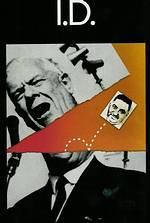I.D
Antony Sher's first play "I.D." which is receiving its world premiere at the Almeida theatre is a rich, intense, powerful play that scrutinises the former South African apartheid system and reveals the perverse moral madness it represented. Inspired by the book "A mouthful of Glass" by Henk van Woerden, Sher examines the question of identity through the eyes of Hendrik Verwoerd, the South African Prime Minister who became known as the Father of Apartheid and his assassin Demetrios Tsafendas.
Demetrios is a man in search of an ID. He was born half Greek, half African in colonial Mozambique. He never had a permanent home, and travelled through Africa and parts of Europe an unwanted immigrant, forced out of one country after another. In South Africa he is forbidden by mixed-race laws to marry the black woman he believes he loves and so tries to register as a coloured person.
The Prime Minister Hendrik Verwoerd is also in search of an ID, but his search is for the ID of a nation, the identity of the white race. He tries to justify South Africa's white supremacy ideology through apartheid and independent Bantustans, i.e. black townships in which 14% of the land was handed over to the blacks, 86% was kept for the whites. This allowed the pretence of separate development by the different races, but in reality merely maintained white dominance. We are introduced to Hendrik Verwoerd as he explains his admiration for Hitler and extols the virtues of white supremacy. He appears hideously calm and serene as he justifies his racist beliefs.
All though Demetrios Tsafendas is seeking an identity for himself, an identity that will gain him the respect he longs for he is not willing to gain that respect by accepting the racism that surrounds him. When invited to preach inside a black church he shocks the congregation with his outburst in which he praises illegitimacy and gleefully proclaims, "God bless the bastards". Under apartheid to be born of mixed parents immediately made one illegitimate because mixed marriages are illegal. Demetrios appears to imply that under apartheid it is the bastards that are legitimate and the white supremacists that are illegitimate.
Sher uses the theatrical device of providing Demetrios with an on-stage alter-ego, Lintwurm. Lintwurm is the tapeworm that has been developing inside Demetrios since he was a child. A belligerent worm that has grown from the hatred and segregation he has been forced to endure all his life, a worm that poisons his blood and devours his spirit. If Demetrios struggles to accept his fate, Lintwurm seethes against it. When Demetrios gets a job as a parliamentary messenger in the House of Assembly, he stands before the speakers chair overwhelmed by the power it symbolises, whilst his anarchic alter-ego Lintwurm bears his buttocks in contempt! Incited by Lintwurm, Demetrios eventually stabs Hendrik Verwoerd to death in parliament in 1966. Is this the act of a man driven mad, or the radical act of an anarchist destroying the creator of an inhumane society? Sher never answers this question; it becomes yet a further question about Demetrios' identity.
After the assassination Demetrios is declared insane and so never placed on trial, but this does not stop him from being incarcerated on death row in solitary isolation with a light that shines in his cell 24 hours a day. When he is finally released, after the collapse of apartheid in 1993, and taken to hospital, he is asked what he would most like? Demetrios replies without hesitation 'Darkness'!
Demetrios' incarceration proves a fitting metaphor for the whole play. All his life he had been segregated from others, forced to examine his identity in the cold light of white supremacy. Anyone forced to constantly endure this light is bound to struggle with his sanity. Is it any surprise he longed for darkness, where he could escape this question of identity? In the dark the colour of a person's skin cannot be seen, racism becomes obsolete! Light is usually used to symbolise what is morally good, it seems fitting that in this play what is good should be represented by darkness.
I thought it rather egotistical of Antony Sher to act the leading role in his own script, and may be it is, but egotistical or not, Sher gives a brilliant performance. His Demetrios is an innocent victimised by a world gone mad who despite the hatred flung at him manages to hold onto a dishevelled dignity. A mesmerising performance that allows you to ask is Demetrios a mad man who simply commits murder, or a political assassin who struck a lethal blow against injustice?
Alex Ferns has the far more difficult task of playing Demetrios' alter-ego Lintwurm, but he does so with consummate skill. The craziness he brings to the character is one born out of defiance of injustice. Marius Weyers is also excellent as Hendrik Verwoerd, the dispassionate father of apartheid whose conviction in white supremacy is born out of an inflexible blind faith.
The director Nancy Meckler grapples with the essence of this drama that explores the question of identity and madness in a world where racial inferiority has become a social dogma and delivers an award winning production.
What other critics had to say.....
NICHOLAS DE JONGH for THE EVENING STANDARD says, "A Disappointing assassination drama, with Sir Antony Sher giving an old-fashioned, look-at-me performance..." MICHAEL BILLINGTON for THE GUARDIAN says, "Compelling portrait both of a complex character and a crazed nation."
External links to full reviews from popular press
The Guardian
Originally published on
